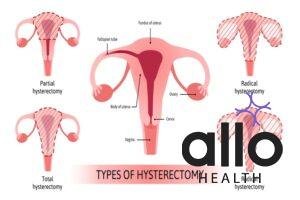Understanding Bleeding During Sex After a Hysterectomy

Allo Health is dedicated to personalized well-being, offering support and trusted information tailored to individual health goals. The platform emphasizes human-generated content, led by a distinguished medical team of experts, including physicians and sexual health specialists. Their commitment to credibility involves rigorous fact-checking, authoritative research, and continuous updates to ensure accurate, up-to-date information. Allo Health's unique approach goes beyond conventional platforms, providing expert-led insights and a continuous commitment to excellence, with user feedback playing a crucial role in shaping the platform's authoritative voice.

Dr. Warisha holds an MBBS degree from GMERS Medical College, Ahmedabad. She has an in depth experience on sexual and reproductive health and rights.
Why This Was Upated?
Our experts continually monitor the health and wellness space, and we update our articles when new information became available.
Updated on 09 August, 2023
- Article was updated as part of our commitment to diversity, equity, and inclusion.

"The following blog article provides general information and insights on various topics. However, it is important to note that the information presented is not intended as professional advice in any specific field or area. The content of this blog is for general educational and informational purposes only.
Book consultation
The content should not be interpreted as endorsement, recommendation, or guarantee of any product, service, or information mentioned. Readers are solely responsible for the decisions and actions they take based on the information provided in this blog. It is essential to exercise individual judgment, critical thinking, and personal responsibility when applying or implementing any information or suggestions discussed in the blog."
After undergoing a hysterectomy, some women may experience bleeding during sex. This can cause concern and discomfort, and it’s important to understand what might be causing this issue to alleviate any worries and manage the symptoms. Whether you’ve recently undergone a hysterectomy or are seeking information on behalf of a loved one, this resource will offer valuable insights to help you better understand and address the issue of bleeding during sex after hysterectomy.
What is a Hysterectomy?

First, let’s discuss what a hysterectomy is. A hysterectomy is a surgical procedure that involves the removal of the uterus and sometimes other reproductive organs, such as the cervix, ovaries, and fallopian tubes. This procedure can be done for a variety of reasons, such as to treat gynaecological cancer, severe endometriosis, uterine fibroids, or to lower the risk of ovarian cancer.
It is important to note that a hysterectomy is a major surgery and should not be taken lightly. Recovery time can vary depending on the type of hysterectomy performed and the individual’s overall health. Discussing all options and potential risks with a healthcare provider before deciding to undergo a hysterectomy is important.
What Is the Average Blood Loss in This Procedure?
The average blood loss in hysterectomy is 50 to 100 millilitres (mL) for laparoscopic and vaginal surgeries.
Types of Hysterectomy Surgery

During a hysterectomy, your surgeon may choose from different approaches, including:
- Vaginal hysterectomy
- Abdominal hysterectomy
- Robotic-assisted laparoscopic hysterectomy (minimally invasive surgery)
- Radical Hysterectomy
- Total Hysterectomy
- Partial (Supracervical) Hysterectomy
The choice depends on your specific medical needs. Factors like uterus size, overall health, and the reason for surgery influence the recommendation. For instance, a vaginal hysterectomy suits smaller uteruses that can be removed through the vagina. An abdominal approach might be necessary for larger uteruses or complications.
Speak with your doctor to explore these options and understand their benefits, risks, and what to expect during and after the procedure.
Is Bleeding Normal After the Hysterectomy Procedure?
Yes, bleeding after the procedure is normal is up to six weeks in most cases because the body takes time to heal and the stitches to dissolve. Initially, the colour of the bleeding may be dark, but it will fade in colour and flow as time passes.
Abnormal Bleeding:
Abnormal bleeding after a hysterectomy can stem from various factors, including surgical complications like hemorrhage and vaginal cuff tear.
Hemorrhage: It happens in every case. Excessive bleeding during or after the surgery, often due to uncontrolled blood vessel damage, can lead to abnormal postoperative bleeding. You may experience hemorrhage if you have laparoscopic surgery. Symptoms of bleeding due to hemorrhage include:
- Fever
- Nausea
- Pain during and after sex
- Severe abdominal discomfort
Vaginal Cuff Tear: After a total hysterectomy, you may experience bleeding in the vaginal cuff tears. The vaginal cuff, where the cervix was closed off during the hysterectomy, can experience tears from physical strain or inadequate healing, causing bleeding. The symptoms include:
- Watery discharge
- Pressure in the vagina
- Pain in the pelvis or abdomen
- Nausea
Causes of Bleeding During Sex After Hysterectomy
While bleeding during sex after a hysterectomy may not be common, it is still a possible side effect. There are several reasons why you might experience this, including:
- Cervical or Vaginal Lesions: Cervical or vaginal lesions can cause bleeding after sex following a hysterectomy due to trauma to lesions. During sexual activity, friction and pressure can inadvertently cause trauma to existing cervical or vaginal lesions. These lesions are sensitive and can easily bleed when disturbed.
- Healing Tissue: One of the most common causes of bleeding during sex after a hysterectomy is healing tissue. After the surgery, the body needs time to heal, which can take several weeks or even months. During this time, the tissue in the vaginal area may be more sensitive and prone to bleeding during sexual activity.
- Hormonal Fluctuations and Low Estrogen Levels: Hormones play a significant role in regulating the menstrual cycle. After a hysterectomy, hormonal imbalances or low estrogen levels can disrupt the body’s signalling, causing sporadic bleeding.
- Scar Tissue Formation: Surgical procedures can create scar tissue as part of the body’s natural healing response. However, scar tissue might impact the local blood supply, making the area more prone to bleeding.
- Infection: Infections at the surgical site can trigger inflammation and irritation, which can disturb the healing process. The inflamed tissue is more susceptible to bleeding.
- Residual Tissue: If some uterine tissue remains after the surgery, it can continue to shed, leading to postoperative bleeding similar to a menstrual cycle.
- Regrowth of Tissue: In some cases, residual tissue, such as endometrial or fibroids, may regrow and cause bleeding. This can occur if not all tissue is effectively removed during the hysterectomy.
Signs and Symptoms of Bleeding During Sex After Hysterectomy
If you do experience bleeding during sex following a hysterectomy, it is important to know what signs and symptoms to look out for. The most common signs and symptoms include:
- Visible Blood: The most obvious sign is visible blood on underwear, sheets, or after sex.
- Spotting: Light or occasional spotting of blood on toilet paper after intercourse.
- Pain or Discomfort During Sex: Bleeding may be accompanied by pain or discomfort during or after sexual activity.
- Increased Sensitivity: Sensation of heightened sensitivity or tenderness in the vaginal or pelvic area.
- Cramping or abdominal pain: Mild to moderate abdominal discomfort or cramping after sex.
- Abnormal Vaginal Discharge: Noticeable changes in vaginal discharge, such as increased wetness or unusual odor.
- Swelling or Irritation: Swelling, redness, or irritation of the vaginal or cervical area.
Emotional Impact: Feelings of anxiety, embarrassment, or distress due to unexpected bleeding.
Seek Medical Attention if You Experience
- Heavy bleeding for an extended period
- Bleeding for six weeks or more than six weeks
- Darker bleeding that doesn’t fade away
- Heavy vaginal bleeding that gets heavier over time
- Sudden heavy bleeding
- Redness or swelling in the incision site
- Difficulty in urination
Emergency symptoms:
High fever
Watery discharge
Vaginal discharge with foul odor
Difficulty breathing
Bright red bleeding
Heavy pain
Factors that Increase the Risk of Bleeding During Sex After Hysterectomy
While long-term bleeding after a hysterectomy is rare, certain factors can increase the risk. These include:
- Intercourse too soon after the procedure
- Strenuous physical activity or heavy lifting soon after surgery
- Certain medical conditions like endometriosis
- Having a vaginal rather than abdominal hysterectomy
- Age, as older women may take longer to heal
It is important to note that bleeding after sex following a hysterectomy can also be caused by vaginal dryness. This can occur due to hormonal changes or menopause and can be treated with lubricants or hormone replacement therapy.
In some cases, bleeding after sex may be a sign of a more serious issue, such as an infection or vaginal cuff tear. It is important to speak with a healthcare provider if bleeding persists or is accompanied by other symptoms such as pain or fever.
How to Manage Bleeding During Sex After Hysterectomy
If you are experiencing bleeding during or after sex following a hysterectomy, there are various steps you can take to manage the symptoms:
- Speak to your healthcare provider about your symptoms and medical history
- Take it slow and adjust the sexual activity to avoid discomfort
- Use a water-based lubricant to reduce friction
- Doctors suggest alternative forms of sexual activity or refer you to a pelvic floor physical therapist to help address any muscle weakness or tension contributing to your symptoms.
- Avoid engaging in activities that may increase the risk of bleeding, such as heavy lifting or aerobic exercise
Bleeding after sex post-hysterectomy is common, often due to factors like dryness, scar tissue, or hormonal changes.
In some cases, your healthcare provider may recommend hormone replacement therapy or other medications to help manage your symptoms.
- Estrogen Therapy: Systemic or localized estrogen therapy can help address vaginal dryness, thinning, and fragility of tissues, reducing the risk of bleeding during intercourse.
- Combined HRT: Combining estrogen with progestin (synthetic progesterone) may be considered for women with a uterus to balance hormonal effects and reduce bleeding.
- Local Estrogen: Vaginal estrogen creams, rings, or tablets can be applied directly to the vaginal area to alleviate dryness and promote tissue health.
Tips for Preventing Bleeding During Sex After Hysterectomy
While it’s not always possible to prevent bleeding following a hysterectomy, there are some practical steps you can take for a smoother recovery period:
- Avoid sexual activity for the duration recommended by your healthcare provider
- Take time to rest and recover following your procedure
- Using lubrication during sexual activity can help reduce the risk of bleeding
- Eat healthy and balanced meals
- Don’t smoke or use tobacco products
- Attend follow-up appointments for wound and general health checks
Potential Complications of Bleeding During Sex After Hysterectomy
If left untreated, bleeding during sex following a hysterectomy can lead to a variety of problems. These can include:
- Anemia
- Infection
- Scar tissue formation
- Development of pelvic adhesions
- Discomfort or pain during sex
Coping Strategies for Dealing with Bleeding During Sex After Hysterectomy
Adapting after surgery can be challenging, especially with symptoms like bleeding during sex. Coping methods include:
- Support Group: Connect with others who’ve experienced similar issues.
- Talk to Provider: Explore treatments like hormone therapy or supplements.
- Relaxation Techniques: Try meditation or yoga for stress relief.
- Open Communication: Discuss concerns with your partner and explore new intimate approaches.
- Healthcare Provider Referral: Seek support groups or specialized therapists.
- Online Communities: Connect with others via forums or social media groups.
Key Takeaways:
- Hysterectomy is a surgical removal of the uterus and sometimes other reproductive organs, performed for various reasons like cancer or fibroids.
- Abnormal bleeding can arise from complications like hemorrhage and vaginal cuff tear.
- Factors include cervical or vaginal lesions, healing tissue sensitivity, hormonal fluctuations, scar tissue, infection, residual tissue, and regrowth.
- The symptoms include visible blood, spotting, pain, sensitivity, cramping, abnormal discharge and swelling.
- Contact a healthcare provider for heavy or prolonged bleeding or if accompanied by emergency symptoms.
- Certain factors, like early intercourse, heavy lifting, medical conditions, surgical approach, and age, can increase the risk of bleeding.
- Vaginal dryness due to hormonal changes can contribute to bleeding, which can potentially be treated with lubricants or hormone replacement therapy.
Frequently Asked Questions:
Q. Can you get periods after hysterectomy?
A. After a hysterectomy, the menstrual periods typically cease because the uterus, where menstruation occurs, has been removed. However, some women might still experience light bleeding or spotting, which is different from regular menstrual periods. This can occur due to factors like healing tissue, hormonal changes, or residual tissue.
Q. Why do women still have bleeding years after a hysterectomy?
A. While it’s not common to have significant bleeding several years after a hysterectomy, there could be various underlying reasons for this occurrence. These may include hormonal imbalances, scar tissue-related issues, infections, or even the regrowth of certain tissues.
Q. When should I seek medical help for bleeding during sex after a hysterectomy?
A. If you notice any unusual bleeding, such as heavy or prolonged bleeding, bleeding that worsens over time, or if it’s accompanied by other symptoms like pain, discomfort, or fever, it’s recommended to seek prompt medical attention.
Q. Is bleeding during or after sex post-hysterectomy normal?
A. While it’s not common to have significant bleeding several years after a hysterectomy, there could be various underlying reasons for this occurrence. These may include hormonal imbalances, scar tissue-related issues, infections, or even the regrowth of certain tissues.
Q. Can vaginal atrophy lead to sex-related bleeding after a hysterectomy?
A. Yes, vaginal atrophy causes bleeding after sex following a hysterectomy. Vaginal atrophy is characterized by the inflammation and dryness of the vaginal walls due to a decrease in estrogen levels. Hysterectomy impacts the hormonal balance, which may contribute to vaginal atrophy




































